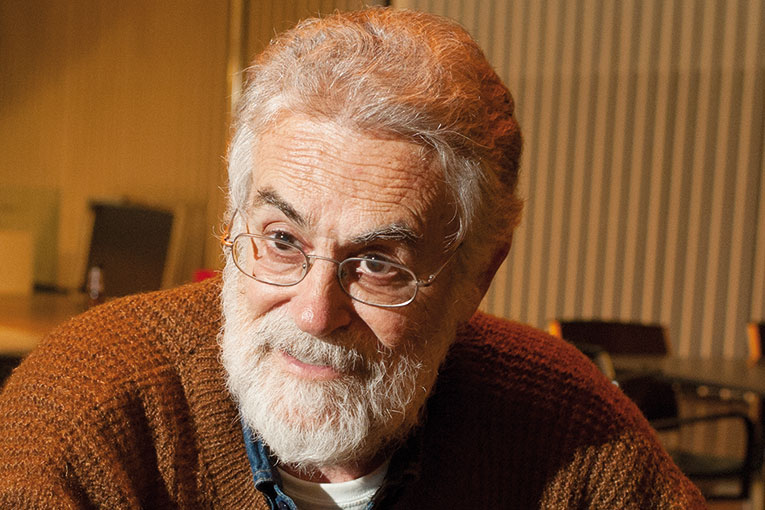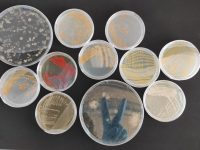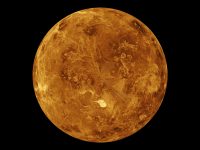Interview with Ricardo Amils
«If there is water on a planet, there is a great chance of finding life»
Astrobiology Researcher at CSIC (National Research Council of Spain), NASA associate

When you hear an expression with such poetic connotations like «the limits of life», it is likely that the last thing that comes to our minds are the microorganisms that live in the depths of Lake Vostok (Antarctica) or in the acidic waters of Rio Tinto (Huelva, Spain). However, extremophile life establishes these are the boundaries of existence, the frontiers of biology. Ricardo Amils, Professor of Microbiology at the Autonomous University of Madrid, is specialised in this field of research, and speaks passionately about extremophiles, which are extraordinary organisms that are able to withstand environmental conditions that would be lethal to humans –and for most known living beings. The study of these conditions is essential for astrobiology because it can help us understand how life might be like on other planets. On the occasion of the visit of Professor Amils to Valencia due to his participation in a tribute to Lynn Margulis held at Octubre (contemporary culture centre), we interviewed him regarding these issues.
I am afraid that you have been asked this question many times and you cannot give a definitive answer, but it is worth trying again. What is life?
We can make a distinction between what we know as living beings, their properties, but so far we can’t give a definition of life. Privileged minds like Lynn Margulis tried to define it and had to admit that the fundamental aspect of biology eludes us. It is a curious paradigm because we study biology and in depth, but we don’t know how to define the subject matter.
«From a statistical point of view, it is accepted that there must be life outside the “Blue Planet”. Astrobiology tries to prove it scientifically»
Will we ever be able to?
As a scientist, I would like that someday a great mind could do it, but I don’t think it will be easy. It is so subtle… Geneticists give their definition, biophysicians give theirs… Any biologist could describe the properties of organisms, but grasping the essence of all this… I am afraid we cannot do that at the moment. Hopefully some day. It will indeed be cause for celebration because we need it.
From a biological point of view… Do life and death take different meanings?
In Microbiology, which is my field, there is no death because organisms are continually cloning themselves. Death, as Lynn Margulis put it, was invented when complex eukaryotic systems were developed. In these eukaryotic systems there are specialised cells devoted to preserve genetic material and to procreate, and there are others at the service of the system. The latter part dies. Lynn’s poetic words, which I have also heard from others, are: the day love was invented, i.e. cell mating, death was invented too. That is a poetic definition more than anything else, but I find it interesting.
«Viruses are an essential part of biology and there is the possibility that they were important in the early stages of evolution»
I was referring to viruses.
Viruses are, like the definition of life, a serious problem. We are all aware of their importance. Moreover, nowadays there are methodologies that ease quantification. In my field, the last thing that has been discovered is that there are many more viruses in extreme environments than in normal environments. That means something I am not sure how to interpret. Viruses do not match many of the existing definitions of what a living being is, especially because they cannot reproduce. They need a host. But there is no doubt that they play a crucial part in biology and that there is the possibility that they were important in the early stages of evolution. From a genetic standpoint, their design is surprising. Their structure is a delicacy.
How useful is it to know if there is extraterrestrial life if we do not know most terrestrial life yet?
If the discussion is about whether it is more important to know our planet better or to begin to develop methodologies and technologies to see if we are alone in the universe, I have to choose the latter as I am an astrobiologist. However, there is no obligation to choose between the two options; the important thing is to determine what percentage of investment deserves every one of them. From a statistical point of view, it is accepted that there must be life outside the «Blue Planet». Astrobiology and space projects try to prove it scientifically. But again, that does not mean that we shouldn’t keep on studying our planet. For example, I have just been introduced to Subsurface Microbiology and we do not know anything about it yet. There is a world down there, which is not affected by radiation, and it is completely different from what we have learned. We are not even able to estimate its volume, its important biomass and, above all, its metabolic importance and its ability to transform what we have under the soles of our shoes.
You claim that if there is extraterrestrial life on Mars, it will be found in layers below the surface and it will be microscopic.
We have already searched every inch of Mars. If there was life on the surface I think that it would have already been detected. Anyway, the existence of life on the surface of Mars is unlikely because of intense ultraviolet radiation (there is no oxygen and therefore no ozone) and the oxidizing given conditions. Oxidants are able to destroy organic matter. Then, from the Viking mission data, it is concluded that life on Mars’ surface is not feasible. But the fact that life in the subsoil is feasible because there is no radiation at a certain depth and there are not oxidation problems suggests that, was there life on Mars, it would be in the subsoil.

Photo: Paolo Bocchese
Until recently, our anthropocentric vision has led us to think that there could be no life outside our living conditions. However, you work with organisms living in what has been called «extreme environments».
In fact, the very definition of extremophilia, which is the name of this field of research, is anthropocentric because, once we have set the standard, anything that deviates from it is placed at the extremes. We are strangers to a bacterium that lives in a geyser in Yellowstone or at very low temperatures in Antarctica, as we would not be able to live there. Still, we must not forget that an important part of known organisms live in a strip of habitability with common characteristics related to atmospheric pressure, temperature or radiation. Beyond these areas, the big surprise has been finding that life is able to adapt to much more extreme conditions. The so-called «limits of life» is what we are studying right now.
And what are they?
In temperature, from what we know so far, it is believed that there are organisms that live, or at least are able to remain alive, at 121ºC and -20ºC. At saturating concentrations of salt, there are organisms that go against the notions of biophysics we have and also survive at high ionic strength thanks to a solute support that exists inside the and reduces the osmotic pressure. We have also found microorganisms living in acidic pHs. This case is very interesting because natural acidic environments that we know are caused by biology. That is, there would not be adaptation strictly speaking but we could talk about extreme conditions created by organisms themselves. Other extreme environments are related to pressure -microorganisms living in sea beds –or radiation –organisms capable of withstanding high doses of radiation. Each situation deserves a separate study.

Photo: Paolo Bocchese
In the same way that the organisms you have studied in Río Tinto can help us understand how life on Mars could be like, what contributions can other types of extremophiles offer?
In acidic environments such as Río Tinto, conditions at time zero are neutral. But when microorganisms begin to oxidize metals in order to obtain energy, very active proton gradients occur, and they need a strong metabolization to survive so that an acidic environment is generated. That is the lesson we learn from them. As for other types of extreme environments, each one has something to teach us. For example, we can observe the mechanisms used by organisms that are resistant to radiation, because that will be the most serious problem that astronauts going to Mars will have to face. Organisms living at high pressures also have interesting properties for us. But those who are more interesting for us are thermophiles. As the Arrhenius equation says that the reaction rate doubles whenever the temperature increases ten degrees, it is clear that in biochemistry, when working at high temperatures, reactions will be much faster. It has a clear practical application in biotechnology. Organisms that live in high salt concentrations could help us to study biochemical reactions in nearly anhydrous conditions.
«We have already searched every inch of Mars. If there was life on the surface I think that it would have already been detected»
What do anoxygenic photosynthetic bacteria have that humans don’t?
A lot! [Laughs.] Some anoxygenic photosynthetic bacteria are able to breathe, ferment and photosynthesize, and choose whatever suits them better depending on the conditions in which they find themselves. Therefore, if I was to be born again I would choose to be photosynthetic bacteria because the only thing you and I know how to do is breathing, and getting energy from carbohydrates. We are heterotrophic and dependent on someone or something that produces the biomass we need to use. These organisms, however, can adapt to very particular conditions.
Why are astrobiologists so obsessed with water?
There are three essential elements we need for life to exist in the specific systems we know on Earth: a solvent (in our case water), a power source (it can be varied: radiation, chemical compounds or even inorganic compounds) and nutrients, the basic components of macromolecules (carbon, etc.). We have found in the universe energy and basic molecules to synthesize any organic compound. The only thing that is required is the third condition: water. Hence the obsession. It is so much so that if there is water on a planet, the possibility of life is great. That is the reason why the exploration of Mars is so important, there is no doubt that there has been a lot of water on Mars and it is still there. Mars’ poles have ice water in significant quantities.
«The very definition of extremophilia is anthropocentric because, once we have set the standard, anything that deviates from it is placed at the extremes»
Mars is their second obsession.
Due to its proximity. Mars is not more interesting than Europa, Ganymede and Titan. What happens is that getting to Mars is much easier than going to other places. Considering that technological development is a very important part in a space mission, the excuse of going to Mars in order to learn how to travel through space is good enough to keep on using it. In addition, there is no doubt that Mars and the Earth were similar planets at when they originated. Why is there life on Earth and apparently not on Mars? Maybe there was life and is no more. All these options are interesting. But the main reason behind this obsession is that it is the closest planet. It has to do with economy.
According to your opinion, life originated in a place that was protected from radiation. Why?
Well, radiation hurts a little bit [Laughs]. There is no doubt about it. Moreover, radiation has both an upside and a downside. The upside is that it produces mutations and favours evolution. The downside is that if the number of mutations is too large, that is it; there would be no offspring, and therefore the experiment is over. There is no doubt that when life appeared on Earth about 3.5 billion years ago or earlier, we were faced with two important phenomena. The first one was that there was no oxygen, therefore, there was no ozone or protection from radiation. The other was meteorite impacts. Then, in order to remain protected from radiation and meteorite impacts, the subsoil is far more advisable than the surface. Either way, it is a hypothesis as valid as the one people like Antonio Lazcano, Aleksandr Oparin and Lynn Margulis defened. They all agreed that the origin of life was fermentative. I think those are opposite hypotheses and that enriches science. If we all agreed, it would become a dogma that no one would question.
Proust Questionnaire
Your virtue: Humility.
Your virtue of choice in a man: Generosity.
Your virtue of choice in a woman: I reiterate generosity.
Your favourite occupation: Science, I cannot do anything else.
Your chief characteristic: I am a little obsessive.
Your idea of happiness: Everybody getting along well and enjoying some peace and quiet.
Your idea of misery: Selfishness, that we are selfish.
Your favourite colour: Yellow, I never knew why.
Your favourite flower: Consequently, daisies.
If not yourself, who would you be? I can hardly imagine it because I am so mono-directional… In my youth I never thought that I would become a scientist. At that time I could have done other things I was interested in, like music or literature. But I chose this path and I have never looked back.
Where would you like to live? I like Madrid. It is a cosmopolitan city.
Your favourite prose authors: Samuel Beckett is my youth idol and still is in my senescence [Laughs].
Your favourite poets: I have a long list. I just saw in the newspaper one poet that I really enjoy: Huidobro, a Chilean poet. But there are others too. I am not very specific when discussing poetry.
Your favourite painters and composers: My favourite painter is Dalí, by all means. Composer… I like Satie.
Your heroes in real life: Normal people that do what they have to do.
Your heroines in real life: Same.
Your heroes in fiction: I am really bad at that sort of thing. I would not choose any.
Your heroines in fiction: Barbarella. I liked her because she was so beautiful. But only aesthetically, not for any other reason.
Your favourite food and drink: I really enjoy couscous and drinking good wine.
Your favourite names: Olivia, which is the name of my granddaughter.
What pet do you dislike? I am not very fond of snakes or anything that crawls.
What characters in history do you most dislike? Those who have imposed their views. Fascists.
What is your present state of mind? Positive.
For what fault have you most toleration? In general, most of them, because we are all flawed. I am tolerant.
What is your favourite motto? Go for them. They are few and cowards.





